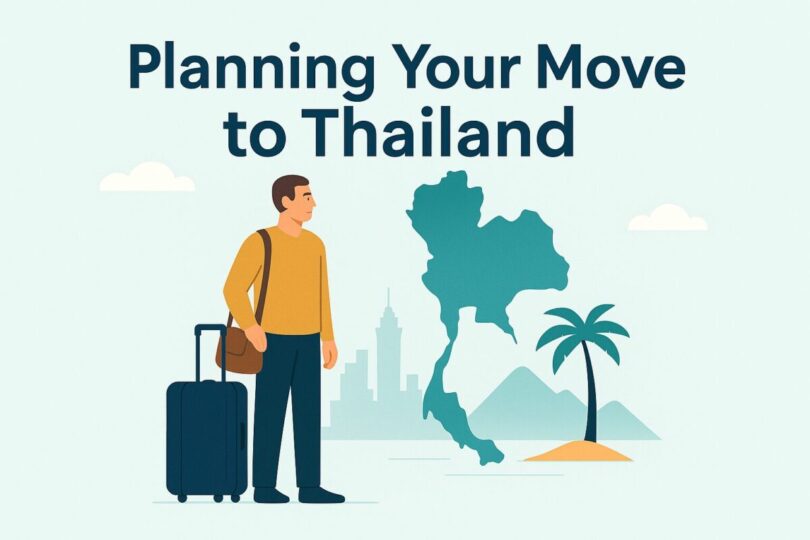Introduction: The Leap Before the Big Change
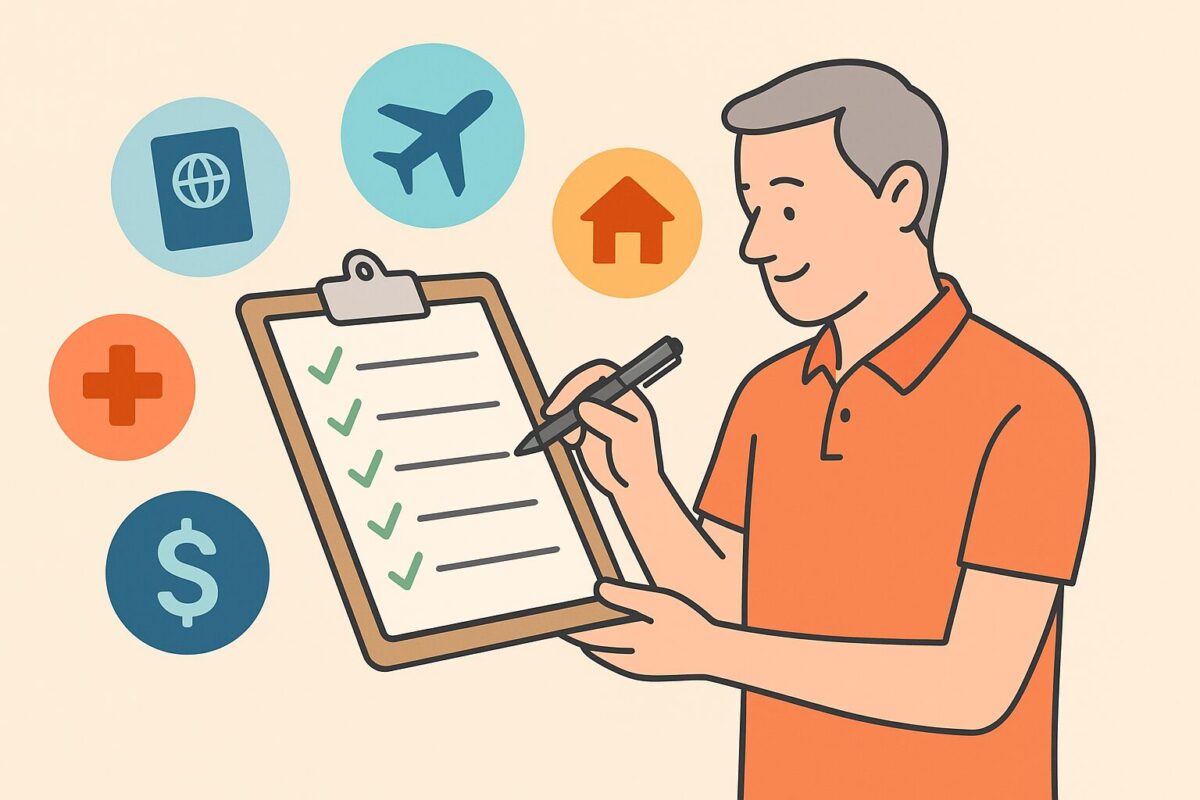
Moving to Thailand feels wonderfully simple when you first get the idea. You imagine warm evenings on your balcony, a gentler rhythm to each day, and a fresh start in a place that seems permanently on holiday. Friends back home envy you. You begin browsing condos on YouTube, scrolling through photos of white sand beaches, and picturing yourself sipping coffee in a Chiang Mai café or watching the sunset from a Bangkok rooftop.
The truth is that relocating to Thailand is absolutely possible, hundreds of thousands of people do it, and many end up wondering why they did not make the move sooner. But it is also a life changing decision that works best when you prepare for it properly. A successful long term move involves far more than booking a flight and finding an apartment. You have to make sense of the visa system, choose the right region for your lifestyle, organise finances, plan healthcare, understand cultural differences and prepare emotionally for the transition. Most newcomers underestimate the preparation because the destination feels familiar from holidays and social media.
Living here is different from visiting, and the transition goes much more smoothly when you understand that from the beginning. having the right mindset will also be a bonus for your mental health.
This guide breaks the process into clear, manageable steps. It covers the practicalities you need to sort before you arrive, the choices that shape your everyday life once you land, and the emotional realities that come with leaving a familiar world behind. Think of it as your pre move preparation manual. It helps you avoid common mistakes and understand what really matters during the planning stage. By the time you have worked through the checklist, you will feel confident, organised and ready to begin your new chapter in Thailand without unnecessary stress.
If you are reading this because the idea of moving has been growing louder in your mind, you are already on the first step. The planning begins now.
Clarifying Your Purpose and Lifestyle Goals
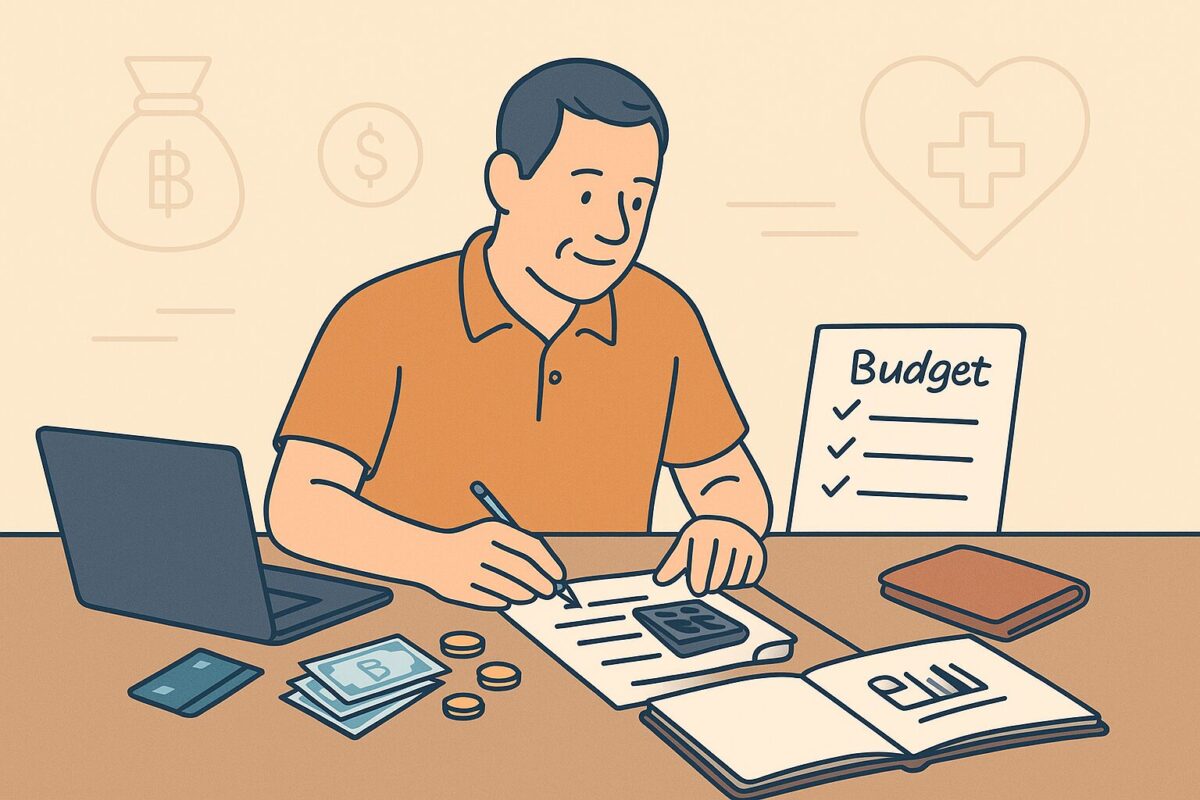
Before you look at visas, budgets or rental listings, it helps to understand why you want to move to Thailand in the first place. Most people focus on the practical steps of relocation, but the most important decisions happen at a deeper level. Your reasons for moving will influence every choice you make, from where you live to how much money you will need each month and the kinds of routines that will support you once you arrive.
Many expats move for a mixture of reasons. Some want a slower pace of life after years of demanding work. Others are chasing sunshine and a simpler daily rhythm. Some come for new relationships. Others arrive because their remote job finally gives them the freedom to live abroad. Retirement is a common reason, as is the feeling that life back home has become predictable or uninspiring. Whatever your motivation, being honest with yourself about it helps you make better long term decisions.
Lifestyle priorities matter too. Someone who wants an active social life will thrive in a large city or a coastal expat hub, while someone who values peace and nature might prefer a quieter town or an island. If you enjoy fitness and outdoor activities, you will find very different routines in Phuket or Chiang Mai compared with Bangkok. If you need strong international schooling, your choices narrow to a few urban centres. If you plan to work remotely, access to reliable internet will shape your options.
It is helpful to picture your ideal day in Thailand. Ask yourself practical questions. Do you want to walk to coffee shops or would you rather live in a house with a garden? Do you want nightlife nearby or would you prefer a quiet soi? How important is access to high quality healthcare? Do you prefer international supermarkets or are you happy eating mostly Thai food? Do you want to be around other foreigners or be more immersed in local neighbourhoods? Your answers will help you match your expectations with the reality of living here.
Some people also move abroad hoping a new country will solve old frustrations. Thailand can give you a fresh start and a healthier routine, but it cannot rewrite your personality. If you dislike your job, struggle with loneliness or feel directionless, a change of scenery helps only if you are prepared to build new habits and routines once you arrive. Recognising this early prevents disappointment later.
Taking time to clarify your purpose and lifestyle priorities makes the rest of the planning much easier. It narrows your choices, helps you avoid rushed decisions and gives your move a sense of direction. Once you know what you want your life in Thailand to look like, you can begin the practical work of making it happen.
Understanding Thailand’s Visa System Before You Move
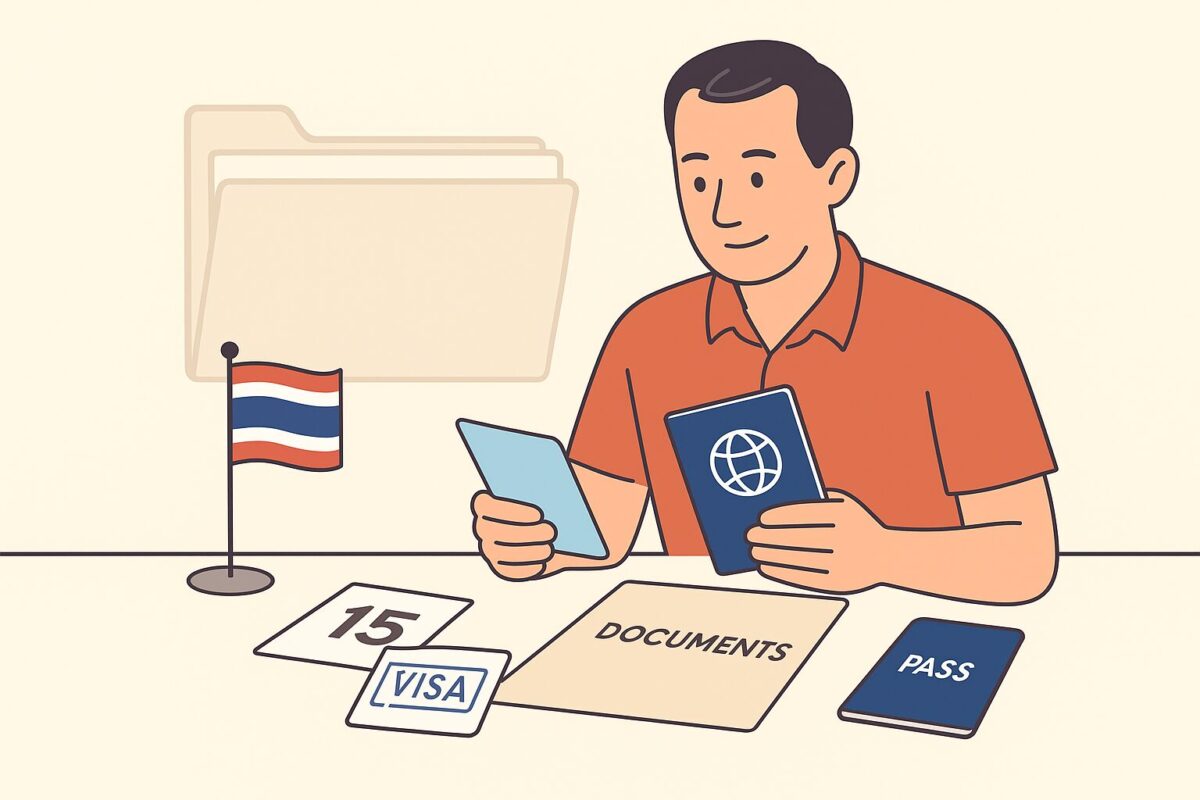
If you want your move to Thailand to be smooth, understanding the visa system is one of the most important steps. Many newcomers underestimate this part because Thailand feels easy to visit as a tourist. Long term residence is different. The rules are clear but not always intuitive, and there are several paths depending on your age, income, work situation and long term plans. Sorting out the right option before you arrive saves stress, unnecessary costs and time spent making emergency trips to embassies or border checkpoints.
Short Term Entry: What Most People Start With
Visitors from many Western countries can enter Thailand without a visa for a short stay. This visa exemption is fine for a holiday but not ideal if you intend to stay long term. You can extend it once inside Thailand, but it is not a reliable route for building a life here. Some people try to string together repeated tourist entries or border runs. It works temporarily, but immigration officers can and do question people who appear to be living in the country without the correct paperwork.
If you know you want to stay for several months while you explore areas and arrange your long term visa, a proper Tourist Visa obtained from a Thai embassy in your home country is a better idea. It can sometimes be extended twice, which gives you breathing room while you figure out the next steps.
Retirement Visas: A Common Route for Over-50s
Thailand’s retirement visas are a stable and well established option. They are designed for people over 50 who do not plan to work. They require proof of income, savings or a combination of both. The financial rules can vary slightly depending on where you apply, so it is always worth checking with the Thai embassy in your home country first.
Some people choose to apply for a retirement visa after they arrive in Thailand, while others handle the paperwork before they move. Whichever route you take, make sure you meet the financial requirements and understand the ongoing obligations such as annual reporting and bank balances. These visas are practical, predictable and widely used by long term expats.
Marriage and Family Visas
If you are married to a Thai citizen or have Thai children, you may be able to apply for a Non Immigrant O visa based on family relationships. The requirements are similar to the retirement visa but with different financial thresholds. This visa also allows someone to apply for a work permit if employment is part of their plan. It can be renewed inside Thailand and often becomes the long term visa of choice for mixed families.
Work Visas and Business Options
Working legally in Thailand requires two things: a Non Immigrant B visa and a work permit. The employer usually handles much of the process and must meet specific conditions related to company size and staffing. It is possible to run your own business in Thailand and apply for a visa through your company, but the requirements are strict and include registered capital, tax filings and employee ratios. Many people underestimate the amount of paperwork involved in setting up a business here, so it is worth getting legal advice before committing to that route.
If you are a remote worker employed by a company outside Thailand, the situation is more complex. Remote work does not neatly fit into older visa categories, although certain long term visas now include options for high earning professionals or specialists. Always check the most recent information, because interpretations and policies change over time.
Education Visas: More Useful Than You Might Think
Education visas are sometimes used by people who want to learn Thai or another subject at an approved school. They allow you to stay in the country while studying and can offer a structured way to integrate. They are not a fast track to long term residency and should not be used as a loophole, but when used properly they are a valid option for some newcomers.
Long Term Resident (LTR) Visa and “Elite” Memberships
Thailand has introduced visa categories aimed at attracting high earning professionals, investors and retirees with significant assets. These long term visas can provide stability for people who qualify, but they are not accessible to everyone. There are strict income or investment thresholds. They are worth exploring if you fit the criteria.
The so called “Elite Visa” is a membership program rather than a traditional visa. It provides a long stay through a paid membership. It can be convenient for people who want simplicity, but the cost is substantial, so it suits only a specific type of expat.
Common Mistakes to Avoid
A few predictable errors cause problems for newcomers:
- arriving with no clear visa plan
- assuming rules are the same everywhere in Thailand
- relying on outdated online advice
- confusing what is legally required with what people say on social media
- not preparing documents in advance, especially income proof and passport copies
- believing you can “figure it out later”
People do figure it out, but usually with unnecessary stress.
A clear visa strategy lets you focus on the enjoyable parts of planning your move. Once you know which category suits you best and what paperwork you need, the rest of the relocation becomes far easier to organise.
Choosing Where to Live: Matching Location to Lifestyle
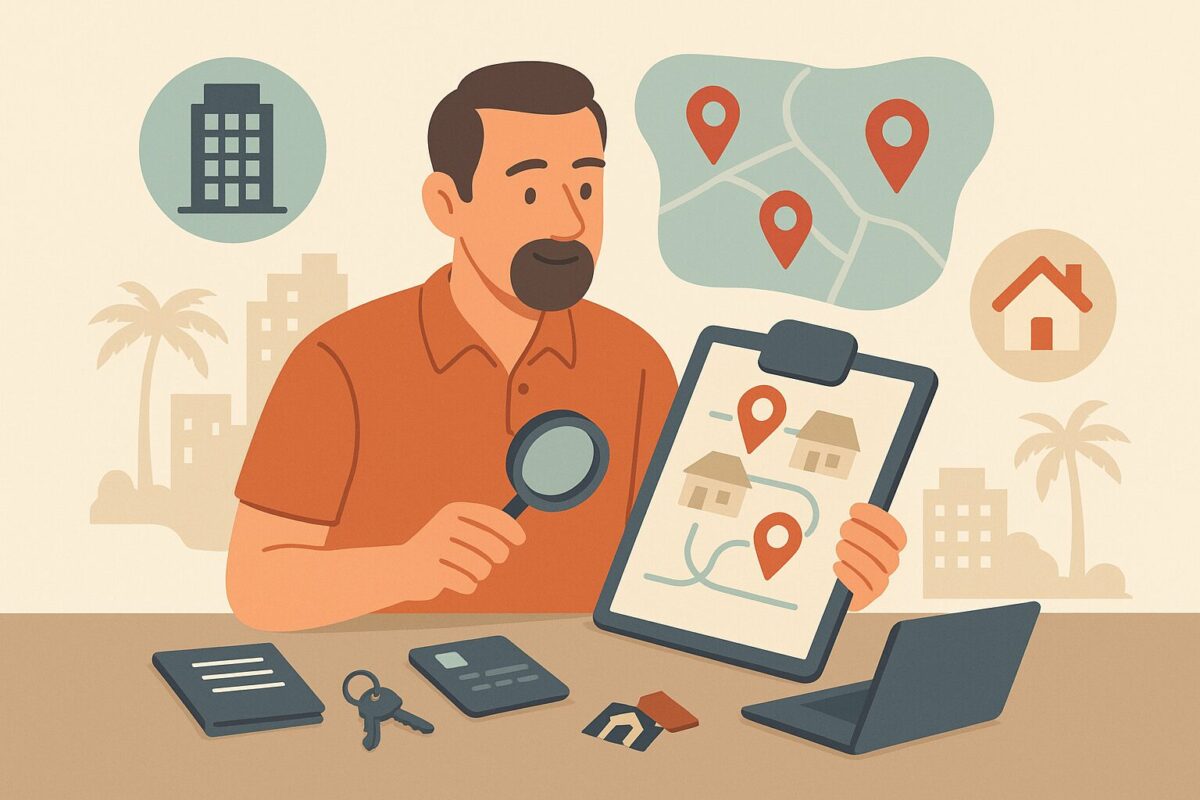
Thailand offers an enormous range of lifestyles, from dense urban living to quiet village life, and everything in between. The country looks small on a map, but the experience of living in Bangkok compared with living on Koh Chang, Phuket or in rural Isaan is almost like living in different countries. Choosing the right place is one of the most important decisions you will make. It shapes your cost of living, social life, daily routines and long term satisfaction. The right match makes Thailand feel like home. The wrong match can make even the most beautiful location feel isolating or inconvenient.
It helps to begin by separating holiday experiences from daily life. Spending a week on an island is not the same as living there year round. Cities that feel overwhelming on a short visit can be comfortable once you find your neighbourhood, routines and favourite shops. When you think about where to live, focus on how you want your ordinary days to look rather than the postcard moments.
Bangkok: Fast, Convenient and Surprisingly Livable
Bangkok is loud, busy and full of energy, yet it offers conveniences that many expats find essential. International hospitals, modern shopping centres, excellent restaurants, strong public transport and a constant flow of activities make it ideal for people who enjoy an active lifestyle. It suits professionals, younger expats, retirees who like stimulation and anyone who wants easy access to services. The downsides are traffic, heat and the constant movement of the city, which can be draining if you prefer quiet surroundings.
Bangkok is also a collection of neighbourhoods, each with its own personality. Living near the BTS or MRT transforms daily life. Areas like Ari, Phrom Phong, Thong Lo and Phaya Thai all have different atmospheres, so your experience will depend heavily on where you settle.
Chiang Mai: Culture, Cafes and a Slower Pace
Chiang Mai is popular with digital nomads, creatives and retirees who want a calmer environment. It has excellent cafes, co working spaces, markets and a more relaxed atmosphere. The mountains and nature trails provide an outdoor lifestyle many people enjoy. Healthcare is good and the cost of living can be lower than in Bangkok. The one major drawback is the annual burning season, which affects air quality for several weeks each year. Some residents simply travel during that period, while others choose a different region entirely to avoid it.
Phuket: Beaches, Fitness and International Schools
Phuket is more than a holiday island. It has established expat communities, international schools, modern hospitals and a strong fitness culture built around boxing gyms, cross training, yoga and outdoor activities. It suits families, long term professionals, fitness oriented expats and those who want a mix of comfort and nature. The cost of living is generally higher, and transport is less convenient without a car or motorbike. Seasonal tourism also affects the atmosphere of different areas.
Pattaya and Jomtien: Convenience and Strong Expat Communities
Pattaya has a reputation shaped by nightlife, but long term expats know it has far more to offer. Jomtien and the surrounding suburbs attract many retirees and remote workers who value convenience, good healthcare and easy access to services. Renting is straightforward, the city is compact and the social scene is active. It is not the quietest place, but for many people that is part of the appeal.
Hua Hin: Calm Beaches and Established Communities
Hua Hin is a quieter coastal town with excellent golf courses, relaxed beaches and a strong community of long term residents. It suits retirees and anyone who wants a slower routine without giving up modern comforts. The social scene is more muted than in Pattaya or Bangkok, but many people enjoy the balance.
Island Life: Koh Samui, Koh Pha-ngan, Koh Chang and Others
Island living can be wonderful if you want nature, beaches and a strong community feel. Each island has its own personality. Samui offers comfort and services. Phangan blends wellness culture with alternative communities. Koh Chang offers quiet beaches and a more local atmosphere. Island life is appealing, but you need to be comfortable with slower logistics, seasonal weather patterns and the fact that the social scene is smaller.
Isaan and Smaller Cities: A Different Kind of Thailand
For those who want a deeper cultural experience or a lower cost of living, the northeast (Isaan) and smaller provincial cities offer a very different lifestyle. English is less widely spoken, Western food options are limited and the pace of life is slower. Many expats with Thai partners choose these areas because community and family connections are strong. It is not for everyone, but it can be rewarding if you want immersion and simplicity.
Choosing where to live is as much about self awareness as it is about geography. Think about the routines that make you happy, the type of environment that suits your personality and the level of convenience you want. Thailand gives you many options, and the right choice makes the transition much smoother.
Budgeting Your Move: The Real Costs (Not the YouTube Version)
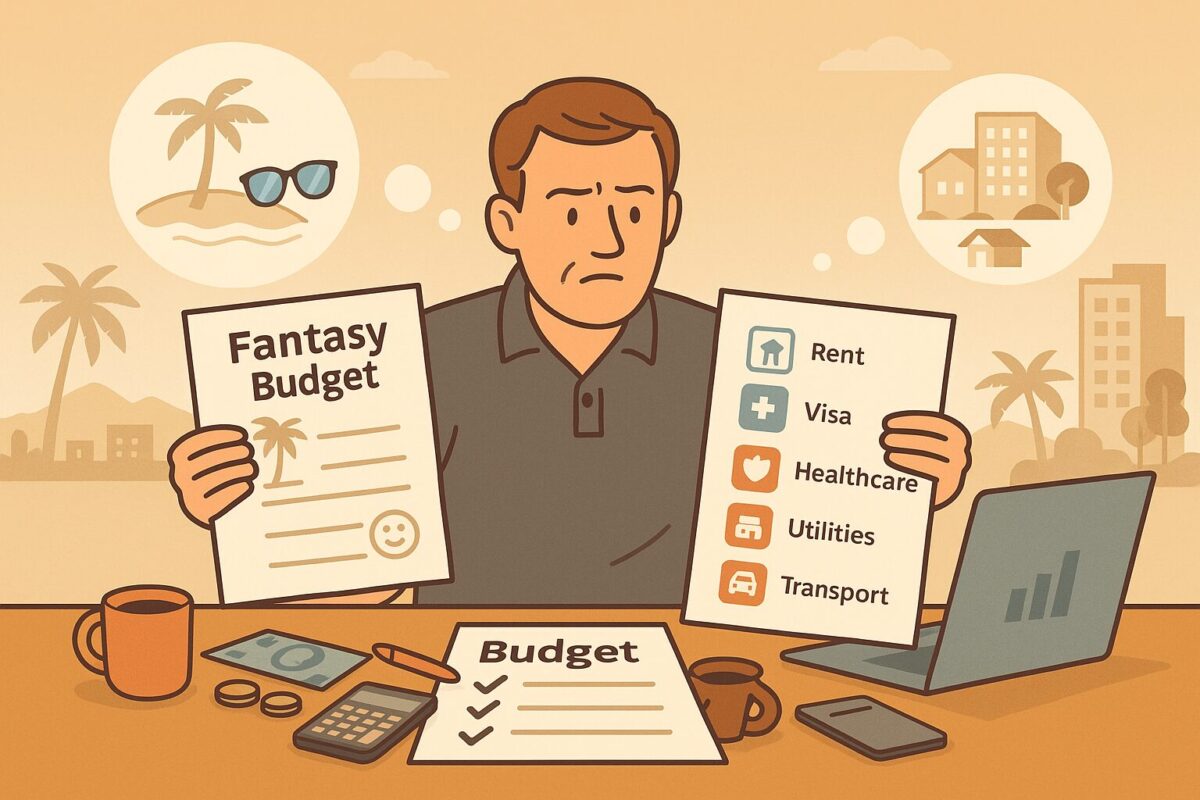
Budgeting for a long term move is not simply adding up obvious expenses like flights and rent. The real cost of relocating to Thailand comes from a combination of one off expenses, early setup costs and recurring monthly bills that can vary widely depending on where and how you plan to live. Many people underestimate the financial side because Thailand is often described as “cheap,” which is true in some contexts and misleading in others. A realistic budget helps you avoid stress and ensures you can settle into your new life without constantly worrying about money.
Upfront Costs to Expect
The first stage of moving usually involves a collection of smaller and larger expenses that add up quickly. Flights fluctuate by season and location, but most long haul fares become more affordable if booked earlier. Visa fees depend on the type of visa you are applying for and whether you do it inside or outside Thailand. If you are shipping belongings, the cost can be substantial, so it is worth comparing shipping rates with storage options in your home country. Many people choose to bring minimal belongings at first and only ship items once they are sure they have chosen the right region and housing.
Other initial expenses include temporary accommodation while you search for a long term rental, deposits on rental properties, setting up utilities, buying essential furniture if the rental is not fully furnished, and basic household items such as cookware, bedding and cleaning supplies. Even small purchases like kitchen equipment or a decent mattress can increase your early spending more than expected.
Monthly Cost of Living: A Range Rather Than a Rule
The cost of living in Thailand varies significantly by region and lifestyle. Bangkok, Phuket and the popular beach areas generally cost more than Chiang Mai, Pattaya or smaller towns. Imported products, alcohol, premium coffee, gym memberships and international schooling are noticeably more expensive than local equivalents. On the other hand, local markets, public transport and Thai restaurants are inexpensive, and many people adapt their routines to balance comfort with budget.
Here is a general sense of realistic monthly spending for different lifestyles:
Budget Lifestyle (local food, modest housing, limited luxuries)
You can live comfortably in Chiang Mai or smaller cities on a modest budget if you eat mostly local food, use public transport and avoid shops that cater to foreigners.
Mid Range Urban Lifestyle (mix of local and imported goods, cafes, some travel)
Common in Bangkok, Pattaya, Chiang Mai and parts of Phuket. This includes a modern condo, meals out several times a week, transportation, moderate entertainment and reasonable healthcare planning.
Higher End Lifestyle (large condo or house, frequent imported food, gym memberships, travel)
Found mostly in Bangkok and Phuket, this requires a larger income but offers strong comfort and convenience.
A realistic budget depends on your habits rather than on averages. If you enjoy international groceries, speciality coffee and frequent nights out, your costs will rise. If you prefer Thai food, home cooking, walking and simple routines, Thailand remains very affordable.
Common Cost Traps Newcomers Underestimate
Several expenses surprise new expats:
Electricity bills during hot season. Air conditioning is effective but costly.
International schools. Fees are extremely high and can exceed Western private school costs.
Healthcare without insurance. Private hospitals are excellent but not cheap.
Island transport. Without a motorbike, travel becomes inconvenient and expensive.
Imported products. Cheese, wine, certain meats and Western toiletries cost much more.
Visa runs and renewals. If you choose a visa that requires travel, the cost can accumulate.
People also forget that the first few months are usually more expensive. You explore more, buy things you forgot to pack, try new places, and adjust your routines.
Building a Stable Financial Plan
Creating a comfortable financial life in Thailand is not only about covering your rent and food. It is about preparing for volatility and unexpected costs. Exchange rates fluctuate, inflation rises and falls, and your preferences will evolve over time. Allowing a buffer in your budget gives you peace of mind. Many experienced expats aim for savings or income that exceed their monthly needs by a healthy margin, especially if they do not have a Thai income.
Having a realistic, flexible budget is one of the strongest foundations for a good life in Thailand. It prevents the stress that comes from running out of money, lets you enjoy your new environment without hesitation and supports long term stability as you build your routines.
Sorting Your Finances Before Takeoff
Organising your finances before you move is one of the most important steps in the entire relocation process. It affects how smoothly you settle in, how quickly you can rent an apartment, how easily you can pay for emergencies and how stable you feel during the early weeks. Many newcomers focus on visas and housing first, but financial preparation is what determines whether your transition is calm or chaotic. The better prepared you are, the less stressful those first ninety days will be.
Banking and Access to Money
Opening a Thai bank account is often easier once you are already in the country, but you still need to plan ahead. Not every foreign bank card works reliably in Thailand, and some charge high fees for ATM withdrawals and foreign transactions. Check your bank’s international policies well before moving. Many expats use global accounts from services like Wise or Revolut to hold multiple currencies and transfer money with low fees. These accounts can be invaluable in the early weeks when you are still organising your local paperwork.
It is also wise to notify your bank that you will be travelling for an extended period so your card is not blocked by automated fraud systems. Bring at least two debit or credit cards from different providers, in case one fails or is lost. Simple things like this can prevent unnecessary panic.
Transferring Money and Managing Currency
Sending money into Thailand has become easier in recent years. Wise, Revolut, Remitly and other transfer services generally offer better rates than traditional banks. Exchange rates can change quickly, and these fluctuations can significantly affect your budget, especially for retirees living on a fixed income. Some expats choose to transfer money monthly to lock in smaller risks, while others prefer to move larger amounts when the rate is favourable.
If you rely on pension payments or income from abroad, set up your transfer schedules before you move. This ensures you receive funds on time and avoid interruptions during your first month.
Understanding Tax Residency
Taxes can become complex when you move abroad, particularly if you still earn money from another country. Some people continue to be considered tax residents in their home country, while others shift their residency to Thailand. These rules vary depending on nationality, source of income and bilateral agreements. If you are uncertain, consulting a tax professional with experience in international relocation can save you trouble later. Problems usually arise when people assume they owe no taxes anywhere, which is rarely true.
Proof of Income and Financial Records
Visas, rental agreements and certain services in Thailand may require proof of income or bank balances. This can include pension statements, bank statements or confirmation of employment. Gather these documents before you move, ideally in both digital and printed formats. Keeping neatly organised financial records speeds up the visa process and helps you settle faster.
Credit Cards and Emergency Funds
Having a credit card with no foreign transaction fees is extremely useful. It helps with booking accommodation, paying deposits and covering unexpected costs. An emergency fund is just as important. Even if Thailand is generally affordable, unexpected medical bills, sudden travel or urgent home repairs can still add up.
Many long term expats recommend having three months of living expenses available in easily accessible funds. This offers a cushion while you settle in, find a routine and adjust to the new environment.
Planning for the First Ninety Days
The first few months often involve more spending than later. You explore, try new restaurants, visit different areas, buy household items and sometimes move apartments as you refine your preferences. Knowing this helps you budget realistically. It is sensible to arrive with a financial buffer rather than attempting to stretch every baht from the beginning.
Sorting your finances before takeoff creates stability and confidence. It reduces the number of surprises you face and frees your attention for the more enjoyable parts of your new life. With your financial systems running smoothly, you can focus on settling in, meeting people and building the routine you want in Thailand.
Healthcare Planning: Insurance, Hospitals and Prescriptions
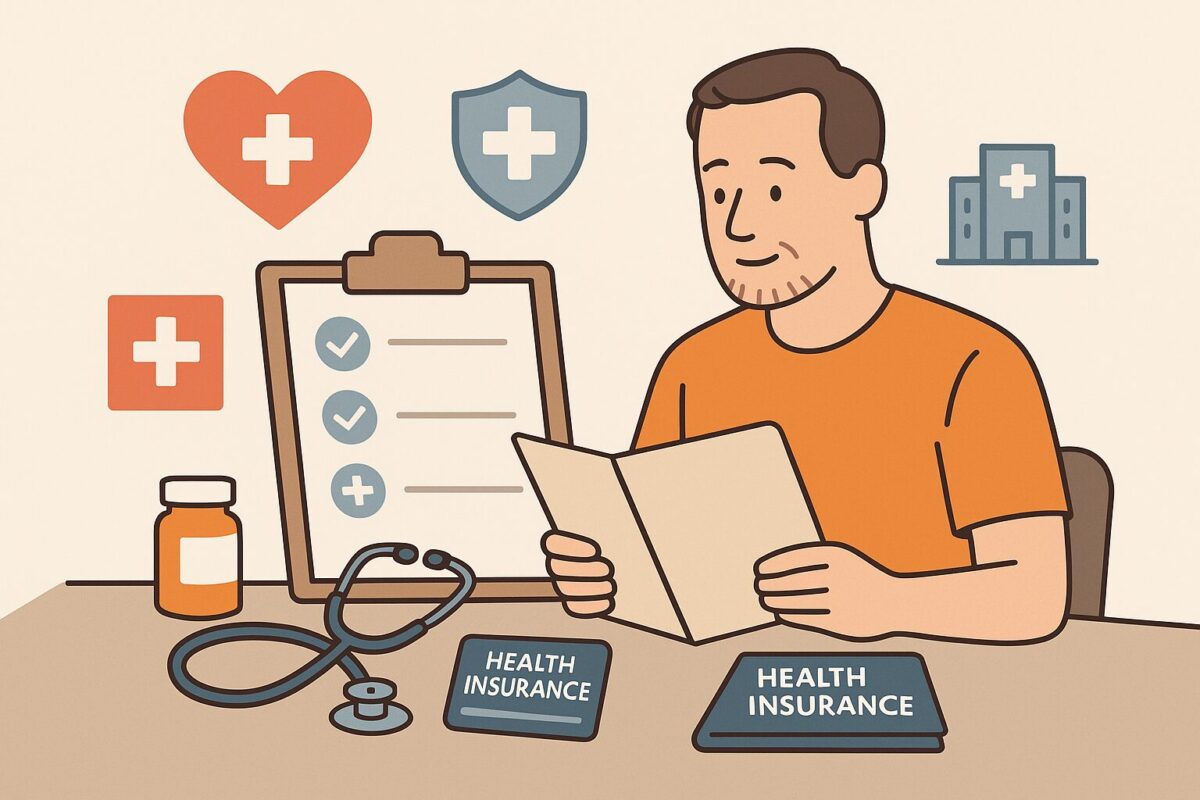
Thailand has some of the best private hospitals in Asia, which is one of the reasons so many expats choose to live here long term. Healthcare is modern, efficient and often more affordable than Western countries, but that does not mean you should assume everything will run smoothly without preparation. Sorting out your healthcare plan early is essential, especially if you are retiring, have pre existing conditions or simply want peace of mind during your first months in the country.
Why Insurance Matters Before You Arrive
One of the most common mistakes new expats make is assuming they can sort out health insurance after they land. While this is possible, it exposes you to risk during the period before your policy is active, which may include waiting times, medical checks or exclusions. Even a short hospital visit can be expensive, and the cost of emergency treatment without insurance can surprise people. Having at least temporary international cover before you move removes this risk.
If you plan to apply for a long term visa, keep in mind that some visa categories require specific insurance policies that meet Thai government criteria. Check the requirements carefully, because not all international insurance plans are accepted for visa purposes.
Understanding Thai Healthcare Options
Thailand’s healthcare system is divided into public hospitals, private hospitals and premium private hospitals. Public hospitals are affordable but busy, with long queues and limited English spoken. Private hospitals offer faster service, modern facilities and multilingual staff. Premium hospitals like Bumrungrad or Bangkok Hospital provide high end care but are priced accordingly.
Most expats rely on private hospitals for day to day healthcare and emergencies. It is worth researching hospitals near the area where you plan to live, as quality varies by region. In Bangkok, Phuket and Chiang Mai, you will find world class facilities. Smaller towns may require travel to a nearby city for specialised care.
Medical Checkups and Preventative Care
Thailand encourages preventative health, and many hospitals offer comprehensive checkup packages at reasonable prices. These can include blood tests, imaging, dental checks and consultations. It is a good idea to get a baseline checkup within your first months, especially if you have moved from a colder climate or have been dealing with travel stress.
Dental care is also excellent and much cheaper than in many Western countries, which makes it worthwhile to schedule regular appointments.
Prescriptions and Ongoing Medication
If you take regular medication, make sure you understand whether it is available in Thailand, whether the dosage matches what you use and whether you will need a local doctor’s prescription. Some medications common in the West are restricted or available only under different brand names. Bring enough medication for at least the first two or three months, along with your prescription documents. Pharmacy staff in Thailand are helpful, but having a clear record of your medication avoids confusion.
If your treatment requires regular monitoring, identify a hospital or clinic that can provide continuity of care. Some specialists book out weeks in advance, so it is worth confirming availability early.
Expat Insurance vs Local Insurance vs Travel Insurance
Healthcare coverage varies significantly between different types of policies. Travel insurance is good for short stays but usually unsuitable for long term residency, especially for those over a certain age or with pre existing conditions. Local insurance companies offer affordable plans but often have exclusions and age caps. International expat insurance tends to be more expensive but more flexible, especially if you want worldwide coverage or plan to travel frequently.
The best choice depends on your age, health status, budget and visa requirements. A younger remote worker may be fine with a mid range international policy, while a retiree with medical needs may require more comprehensive coverage.
Preparing for Emergencies
Although Thailand’s healthcare system is efficient, emergencies still require preparation. Save the phone numbers of major hospitals in your area, know the location of emergency departments and keep essential information accessible. Some expats also carry a small card in their wallet with medical details, contact information and insurance policy numbers.
Healthcare planning may not be the most exciting part of relocating, but it is one of the most important. By handling it early, you protect yourself from avoidable stress and unexpected expenses. Once your healthcare arrangements are in place, you can enjoy your new life in Thailand knowing that you have a stable safety net beneath you.
Housing: Renting, Buying and Avoiding Common Pitfalls
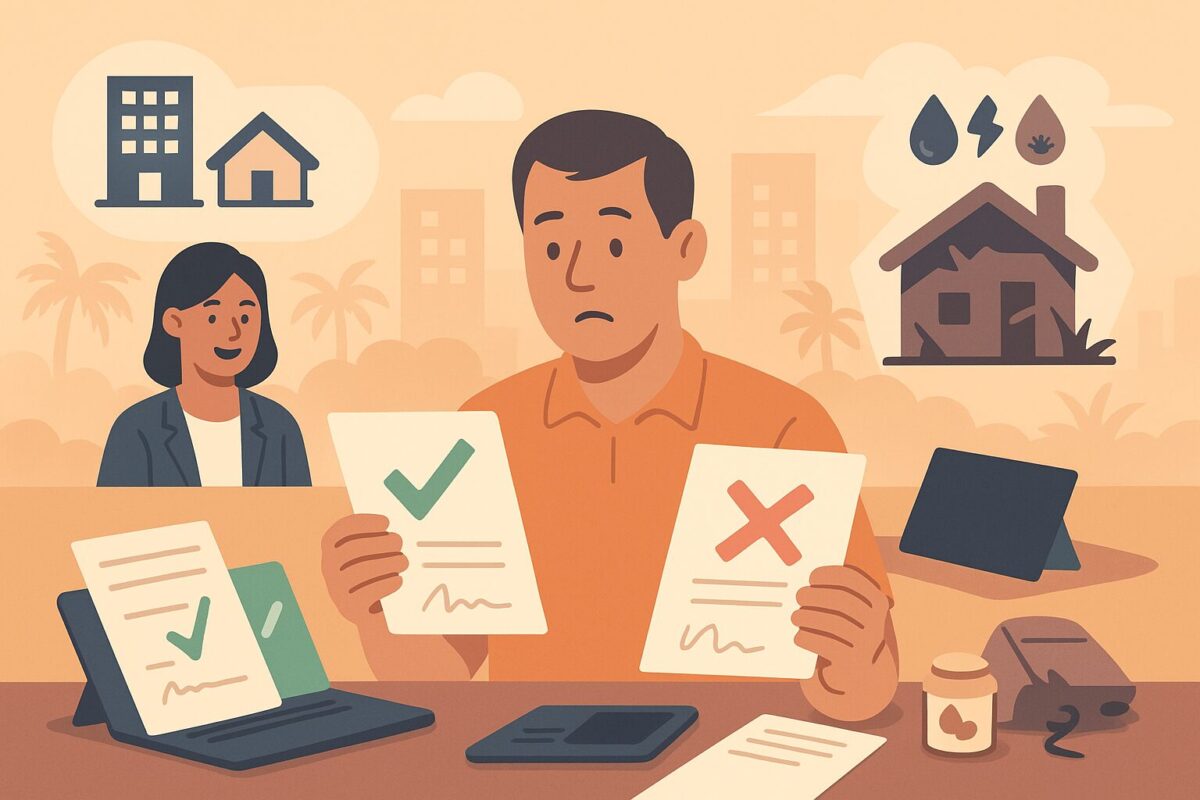
Finding a place to live is one of the most exciting and challenging steps in preparing for a move to Thailand. The housing market varies widely across regions, and the experience of renting in Bangkok is very different from renting in Phuket, Chiang Mai or smaller coastal towns. Most expats start by renting, which is sensible, because it gives you time to understand the area, the climate, the noise patterns and the local conveniences before making any long term decisions. Taking the time to learn how the housing system works will make your search far smoother.
Renting: The Most Practical First Step
Renting in Thailand is usually straightforward. Many apartments and condos come fully furnished, which saves you the effort of buying beds, sofas and appliances during your first weeks. You will normally pay a deposit equal to one or two months’ rent and your first month in advance. Rental contracts vary from six months to one or two years, although shorter agreements are more common in tourist areas.
When viewing properties, pay attention to the details that often catch newcomers by surprise. Water pressure can vary by building, and some older properties have weak showers. Noise levels change dramatically between day and night, especially near bars, construction sites or busy roads. In coastal or island areas, humidity can affect furniture and clothing. Air conditioning units may be older and less efficient, which can drive up electricity bills. These small issues are easy to overlook during a quick viewing, but they can affect your comfort.
Transportation is another key factor. Living near a BTS or MRT station in Bangkok often makes life much easier. On islands or in smaller towns, a motorbike may be essential unless you plan to walk everywhere. Think about how you will get groceries, reach the gym or go to the beach. Convenience becomes increasingly important as the novelty of moving wears off.
Rental Prices by Region
Rental costs depend on location, building age, amenities and time of year. In Bangkok, modern condos in central neighbourhoods are more expensive, while older buildings offer good value. Pattaya, Hua Hin and Chiang Mai generally provide more space for your money. Phuket and certain islands can be expensive, particularly during high season.
It helps to compare a few different neighbourhoods and not commit too quickly. Prices can drop significantly if you move just a few streets away from a tourist area.
Buying Property: What You Need to Know
Buying in Thailand is possible but requires a clear understanding of the rules. Foreigners can legally own condominiums, as long as the building’s foreign ownership quota has not been exceeded. You cannot own land unless it is through specific legal structures that come with strict conditions. Most expats who buy property choose condos for simplicity and security.
Some newcomers consider setting up a company to buy land, but this approach is legally fragile and often discouraged by reputable lawyers. Leasehold arrangements, where you lease land for a long period, are another option but require careful contracts.
If you are thinking of buying, take your time. Renting first gives you a much better sense of which areas suit your lifestyle. Many expats rush into buying because properties seem affordable compared with Western countries, only to realise later that the location does not meet their needs or that they preferred a different region entirely.
Understanding Contracts and Hidden Clauses
Rental agreements in Thailand vary in quality. Some contracts are detailed and fair, while others contain clauses that favour the landlord. Always read your agreement carefully. Look for details about deposit refunds, maintenance responsibilities, early termination and utility billing. It is common for landlords to require tenants to pay for air conditioning maintenance or minor repairs.
If something in the contract feels unclear, do not hesitate to ask for clarification. Most landlords are reasonable, especially if you communicate politely and directly.
What New Expats Wish They Knew
A few recurring lessons appear in most conversations with long term expats:
Do not choose a home based solely on holiday impressions. Life is different from travel.
Visit the area at night. Some neighbourhoods change atmosphere after dark.
Avoid long contracts at first. One year sounds safe, but flexibility is valuable.
Check the building’s maintenance history. A modern lobby can hide poor management.
Inspect for mold and poor ventilation. The climate affects buildings differently.
Be realistic about transport. Convenience shapes daily life more than scenery.
Housing plays a central role in how comfortable you feel during your first year in Thailand. By renting wisely, taking your time and avoiding common pitfalls, you give yourself space to settle gradually and find the place that truly feels like home.
Packing and Shipping: What to Bring and What to Leave Behind
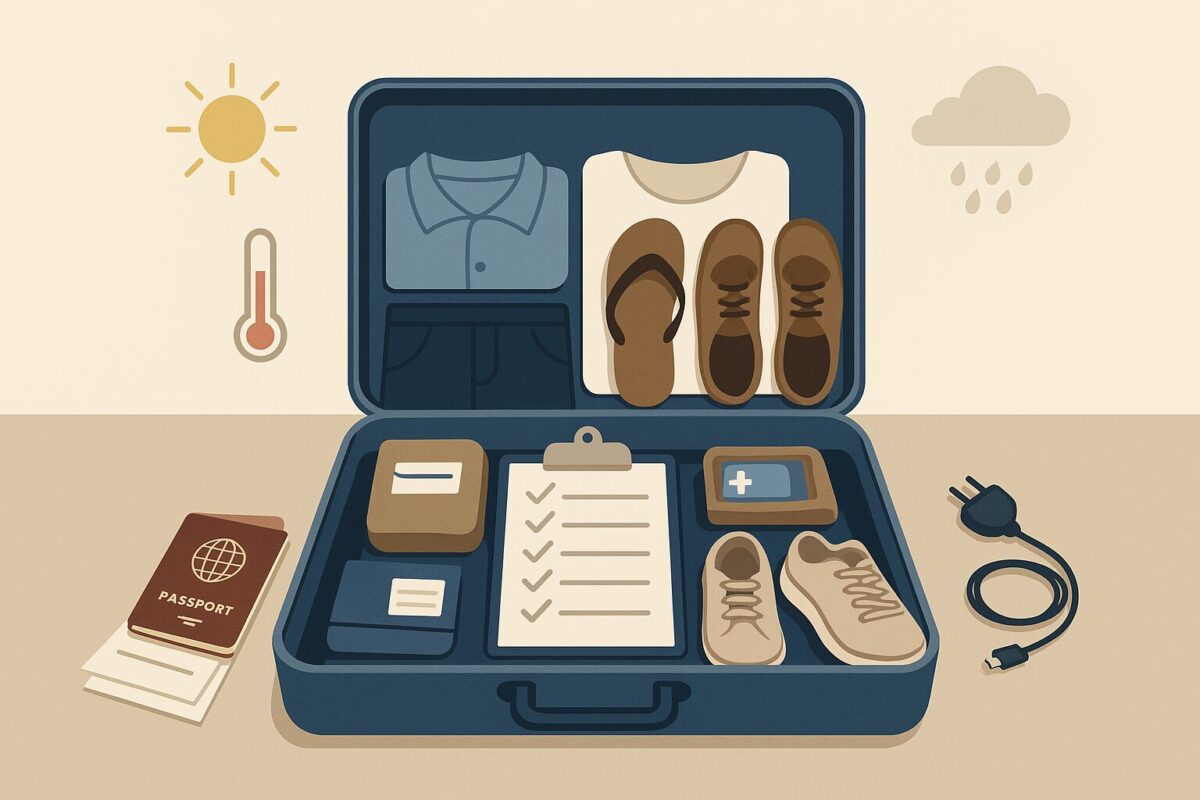
Packing for a long term move to Thailand is strangely difficult. Most people start with good intentions, make a long list, and then end up overpacking. Others do the opposite and arrive with barely enough to get through the first week. The climate, housing style, and availability of certain products in Thailand mean that your usual packing habits may not apply. A thoughtful approach saves you money, protects your belongings and makes settling in much easier.
Understanding the Climate Before You Pack
Thailand is warm, humid and occasionally very wet. Clothes that worked perfectly in cooler climates may not feel comfortable here. Heavy jackets, thick socks and bulky sweaters are rarely needed unless you plan to spend time in cold air conditioned offices or travel to North Thailand in the cool season. Lightweight, breathable clothing is far more practical. Many newcomers arrive with too many warm items and not enough suitable everyday wear.
Shoes are another consideration. Flip flops and sandals are common, but you will also want comfortable walking shoes that handle rain and uneven pavements. Leather can mold in humid climates, especially on islands or in older houses.
What Thailand Lacks (Surprisingly)
While Thailand has modern shopping centres and international brands, some items are either expensive, hard to find or simply not the same quality.
These include:
- Good quality socks and underwear in larger Western sizes
- High quality vitamins and supplements
- Certain skincare items
- Prescription sunglasses
- High end electronics (often more expensive than in Western countries)
- Specialist sports shoes or gear
If these are important to you, bring them.
What Becomes Problematic in Humidity
The climate affects belongings differently than in temperate countries. Items that mold, rust or warp quickly include:
- Leather bags and jackets
- Old books
- Some musical instruments
- Paper documents
- Wooden ornaments
If something has sentimental value, store it safely back home, at least until you have housing with good ventilation.
Shipping vs Storage: The Practical Approach
Many newcomers consider shipping furniture or large personal items. Shipping costs can be high, and customs procedures are slow. Unless your belongings are of high value or sentimental importance, shipping is rarely worth it. Renting a furnished apartment means you do not need your sofa or dining table. Buying furniture locally is often easier and surprisingly affordable.
A more practical option is storing your belongings in your home country until you have settled in Thailand. Once you know your long term location and housing style, you can decide whether shipping makes sense.
Electronics and Voltage Compatibility
Thailand uses 220 volts with a mix of two & three plug types. These are plug types A, B, C, F, and O. Modern electronics generally work fine, but older appliances may not. Laptops, phones and cameras are usually safe. If you use equipment that requires specific plug types or adapters, bring a few high quality adapters with you.
Do not bring large kitchen appliances or televisions. They are easy to buy locally, and shipping them rarely makes financial sense.
Documents and Essentials You Should Bring
Some items are either difficult or inconvenient to replace:
- Original birth certificate and marriage certificate
- Prescription records
- Medical documents
- Driving licence and international driving permit
- Banking and tax paperwork
- Spare passport photos
- A small supply of essential medication
Keep these in your carry on luggage rather than checked bags.
What People Always Wish They Had Packed
After talking with long term expats, a few common regrets appear:
- A few sets of comfortable clothes in natural fabrics
- A well fitting pair of trainers
- A lightweight rain jacket
- A laptop stand or portable keyboard (working from cafes is common)
- High quality bed linens (harder to find than expected)
- A small toolkit or multi tool for basic repairs
Nothing on this list is essential, but each item makes life a little easier during the first months.
What People Almost Always Regret Bringing
Just as common are lists of things people never used:
- Heavy winter clothing
- Large suitcases filled with books
- Expensive ornaments
- Premium frying pans that react badly to gas stoves
- Bulky home decor
- Anything sentimental that cannot handle damp air
Minimalism pays off. It is easier to settle in when you are not managing piles of unnecessary belongings.
Packing for Thailand is not about bringing your entire life with you. It is about choosing what will help you adapt quickly and feel comfortable as you build your new routines. A well packed move makes the first months smoother, less cluttered and far easier to manage.
Digital Setup: Connectivity, SIM Cards, VPN and Essential Apps
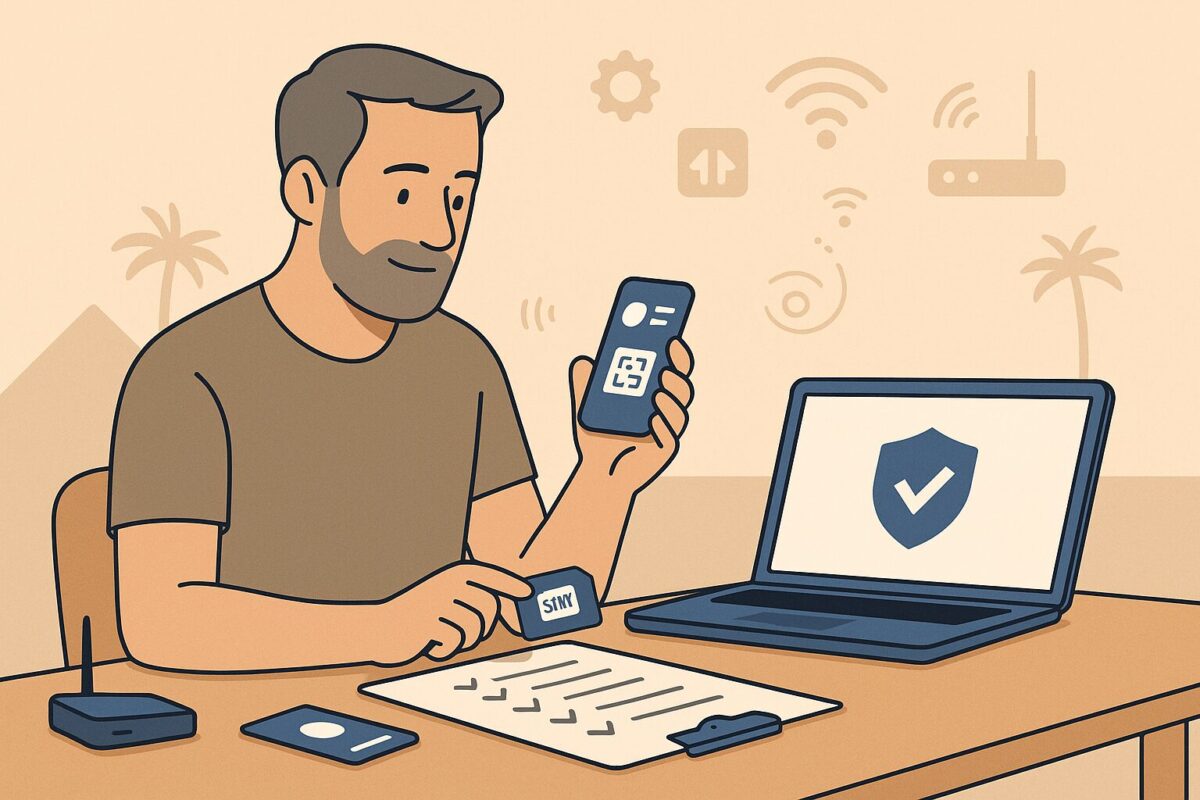
Thailand is one of the most digitally convenient countries in Asia. Internet speeds are fast, data plans are cheap and almost everything from food delivery to bill payments can be handled through an app. A smooth digital setup removes a lot of friction from your early weeks in the country. It also helps you stay connected, navigate unfamiliar areas and manage your day to day life with far less stress. Many new expats underestimate how important this part of the move is, but once you have everything set up, Thailand becomes much easier to navigate.
Getting a Thai SIM Card
The quickest way to feel settled is to get a Thai SIM card as soon as you arrive. The major providers are AIS, TrueMove and DTAC. All offer inexpensive prepaid packages with large data allowances. Airport kiosks can set up your SIM in a few minutes, but you will often find better deals in shopping centres. You’ll need to bring your passport with you when you buy a SIM card.
Having a local number is essential for apartment viewings, delivery services, banking apps and receiving one time verification codes. You also avoid roaming charges, which add up quickly if you rely on your foreign SIM card.
Reliable Home Internet
Thailand offers excellent home internet options, especially in cities. Fibre optic connections are common in all towns and cities. With speeds ranging from basic plans to extremely fast packages suitable for remote work. In rural areas or on islands, availability can vary, so it is worth checking what is offered in your chosen neighbourhood before you sign a long term lease. Some expats also use mobile data hotspots as backups during outages.
If you plan to work online, confirm with your building or landlord whether fibre is available. Not all older buildings have modern wiring. Good internet is one of the foundations of a stress free move.
Useful Apps for Daily Life
Thailand’s digital ecosystem is well developed, and you will quickly rely on several apps:
Grab – For taxis, food delivery and grocery delivery.
LINE – The most widely used messaging app in Thailand. Landlords, employers and friends will all use it.
Mobile Banking App – Once you open a Thai bank account, the app becomes essential for bill payments, transfers and receipts.
FoodPanda – Another major food delivery service.
Lazada and Shopee – The two main online shopping platforms.
Google Maps – Works well across Thailand for walking, driving and public transport.
AirVisual or IQAir – Useful for monitoring air quality, especially in Chiang Mai during burning season.
Installing these apps before you need them saves time. They are part of everyday life for most expats.
Setting Up a VPN
A VPN can be helpful for accessing streaming services, banking websites and accounts tied to your home country. It also adds security if you frequently use public WiFi. Thailand has no shortage of cafes, coworking spaces and hotel lounges where people work or relax online, so a VPN offers peace of mind. Not everyone needs one, but many expats use one regularly.
Organising Your Digital Payments
Contactless and mobile payments are widely accepted. Once you have a Thai bank account, you can link your card to online payments and use QR code transfers, which are extremely convenient. Many people use their phones for almost all transactions, especially in cities. Keeping your foreign cards active is still useful for occasional international purchases, but day to day life becomes easier once you switch to local payments.
Handling Your Digital Life Back Home
Before leaving your home country, make sure:
- Your email addresses are accessible without two step verification tied to your old phone number.
- Bank accounts can send codes to your new number or to an authentication app.
- Important accounts do not rely on outdated contact details.
- Cloud storage is set up for your documents.
Spend an hour updating your digital security, and the first month in Thailand will be far smoother.
A well organised digital setup is more than convenience. It is part of what stabilises your life during the first weeks. Good internet, reliable apps and secure access to your accounts give you the sense of control you need while navigating a new country. Once these systems are in place, everything else becomes easier.
Preparing Emotionally: The Mental Shift Before Moving Abroad
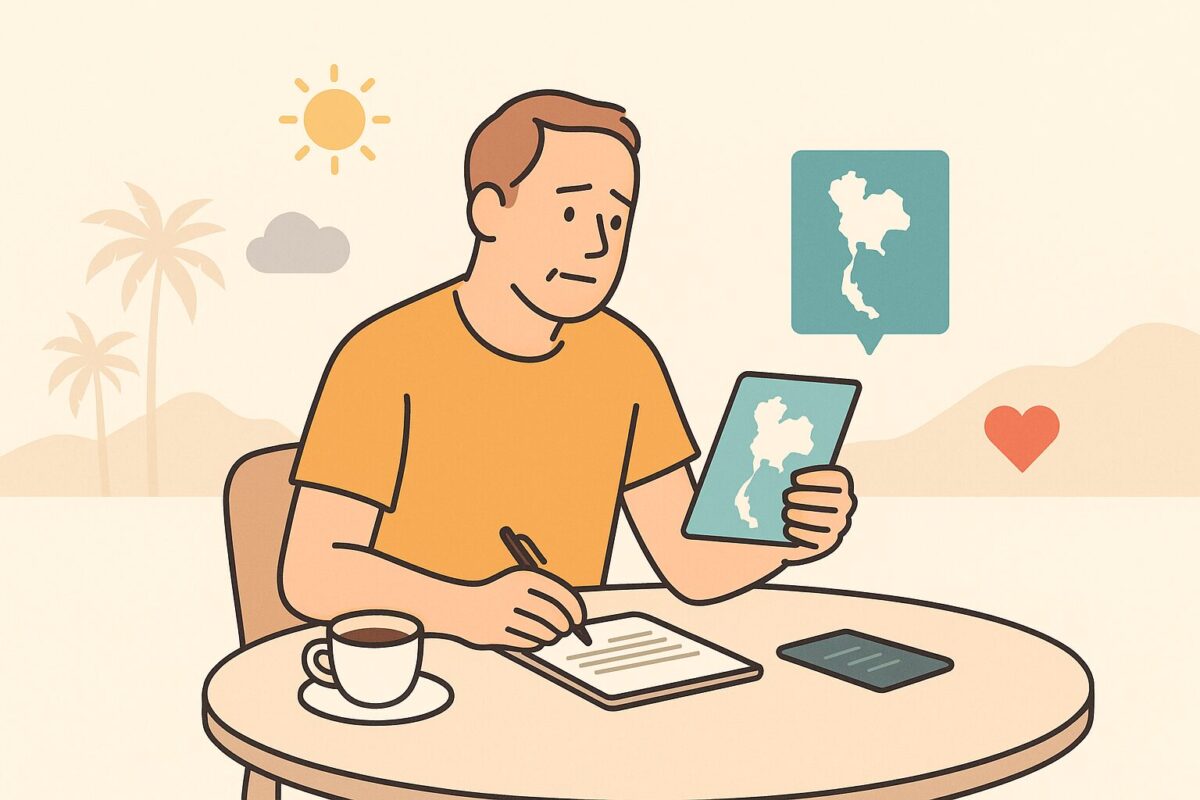
Most people focus on the practical logistics of relocating to Thailand, but the emotional transition is just as important. Moving abroad is not simply changing your address. You are stepping out of familiar routines, leaving behind family and friends, and entering a culture that operates in ways that may feel both exciting and bewildering. Understanding the emotional side of relocation helps you avoid common struggles during the first months and makes the entire move more sustainable.
The First Wave: Excitement and Adrenaline
In the beginning, everything feels new and energising. You are surrounded by different sights, sounds and smells. Simple errands feel like small adventures. You are motivated, curious and full of optimism. This stage is enjoyable, but it does not last forever. It is important to recognise that it is only the beginning of a much longer emotional timeline.
The Dip: When Daily Life Replaces Holiday Mode
After a few weeks or months, the initial excitement fades. You begin dealing with everyday responsibilities. The unfamiliar becomes ordinary. Cultural differences that once felt charming can feel frustrating after repeated encounters. Communication barriers may tire you out. You may miss the ease of your home country, or feel isolated without your social circle, especially if you are retired or working remotely.
This stage catches many newcomers off guard. They assume their negative feelings mean they made a mistake. In reality, almost everyone experiences a dip once their routines begin to stabilise. Recognising that this stage is normal helps you navigate it more calmly.
Loneliness and the Loss of Familiar Structures
One of the most overlooked emotional challenges is the sudden disappearance of your familiar routines. Back home, you may not have noticed how much structure your life had. Work schedules, friendships, family responsibilities and hobbies all give shape to your week. When you move abroad, many of these structures fall away at once. Days become empty or disorganised, and loneliness can appear unexpectedly.
The solution is not to rush into constant activity but to gradually build new rhythms. Creating a weekly routine, joining groups, meeting neighbours and exploring your local area all help rebuild the sense of stability you had before.
Managing Expectations and Avoiding Disappointment
Thailand is a wonderful place to live, but it is not paradise. You will have days when the heat feels unbearable, when a simple errand becomes complicated, or when you wish someone could understand your frustration without explanation. These moments are normal. Disappointment usually arises when people expect Thailand to deliver a permanently easy life. Instead, approach your move with realistic positivity. Good days will outnumber the bad ones, but there will always be a mixture of both.
Maintaining Relationships Back Home
Relationships can change when you move. Friends and family may be supportive, curious or confused. Time zones make communication harder, and you may feel disconnected from people who once filled your daily life. Make a plan for staying in touch. Regular calls, shared photos, group chats and occasional visits help maintain bonds.
At the same time, understand that relationships will evolve. Some may fade naturally, while others will deepen. This shift is part of the emotional cost of moving abroad.
Understanding That Identity Evolves
Living abroad changes you. You learn new habits, develop patience, adjust to different expectations and discover strengths you did not know you had. This personal evolution can feel liberating, but it can also bring moments of uncertainty. You may feel caught between two cultures at times. This is a normal part of building a life in another country.
The Importance of Self Compassion
Be kind to yourself. Moving to Thailand is a major life event. It takes time to adjust, and nothing is gained by expecting perfection from day one. Accept that you will make mistakes, misunderstand cultural signals and have moments of self doubt. The goal is not to glide through the transition flawlessly but to meet challenges with resilience and a sense of humour.
Emotional preparation gives you the stability to navigate the highs and lows of relocation. When you understand the psychological process, the move becomes less overwhelming and more enriching. It allows you to appreciate Thailand with clarity instead of chasing an unrealistic idea of what life should feel like. Patience, honesty and a willingness to adapt are your strongest tools as you build your new life abroad.
The Pre-Move Checklist
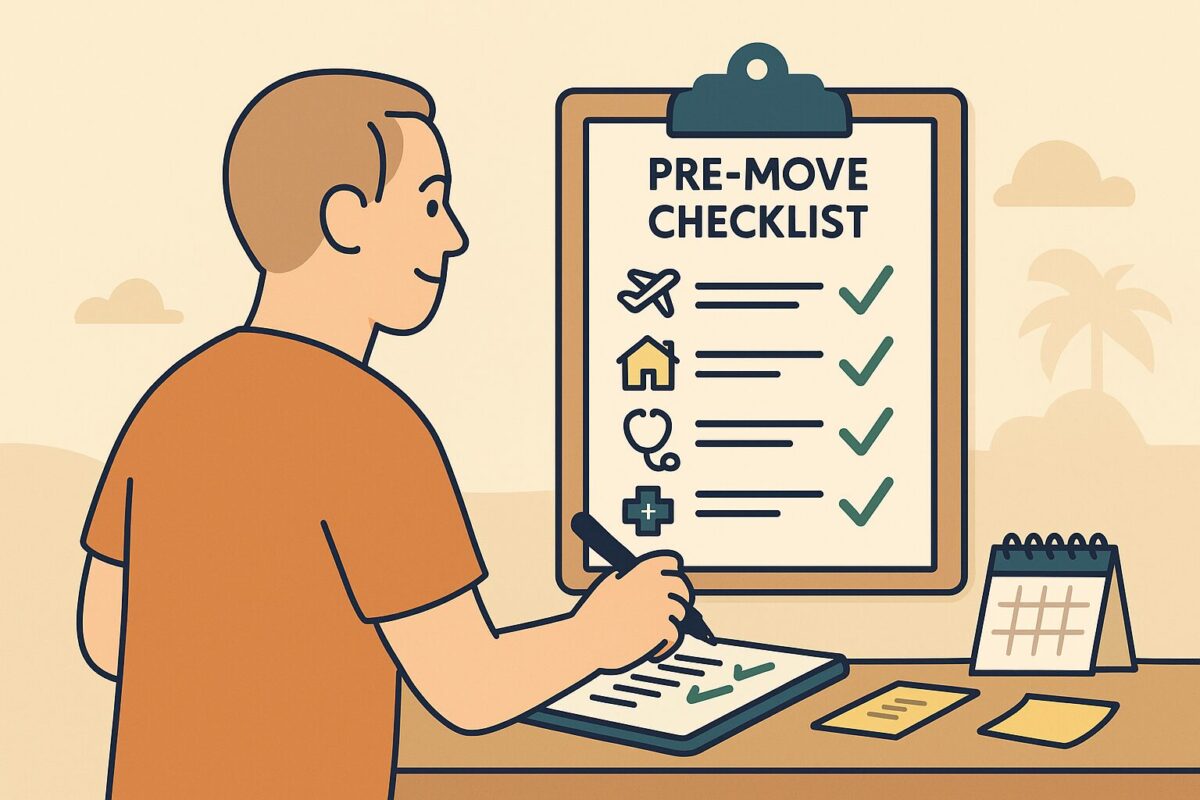
A long form relocation guide is useful, but sometimes you need something simple that you can save, print or screenshot. This checklist distils everything from the earlier sections into a clear set of tasks you can work through at your own pace. It is designed to be practical rather than theoretical, so you can refer to it while packing, organising documents or making final decisions about your move. Treat it as your pre departure roadmap.
Documents and Legal Preparation
- Valid passport with at least six months remaining
- Passport photos for visa applications
- Birth certificate, marriage certificate and any legal documents
- Digital and printed copies of bank statements
- Proof of income or pension documents
- Criminal background check if required for your visa type
- International driving permit
- Contact details for the Thai embassy or consulate handling your visa
- Copies of previous visas or immigration records
Organise these into both digital folders and a small physical file. Having everything ready makes visa applications and apartment rentals much easier.
Visa Planning
- Choose the visa that suits your long term plans
- Check the specific requirements for applying in your home country
- Prepare financial evidence in advance
- Book embassy appointments if required
- Understand the steps that take place inside Thailand after arrival
- Confirm the documents you must bring from home
A clear visa plan prevents last minute complications that can disrupt your move.
Financial Setup
- Two or more debit or credit cards from different banks
- Notify your bank of long term travel
- Set up accounts with Wise, Revolut or similar services
- Prepare a method for transferring pension or salary
- Decide whether you will maintain tax residency in your home country
- Create a clear budget for your first three months
- Set aside an emergency fund
Financial readiness gives you stability while you settle into new routines.
Healthcare and Insurance
- International or expat health insurance active from day one
- Copies of medical records and prescriptions
- A supply of essential medication for at least two months
- List of hospitals near your planned area
- Check whether your visa category requires a specific insurance policy
Sorting healthcare early reduces stress and protects you from unexpected costs.
Housing and Location Planning
- Select potential neighbourhoods in your target region
- Book temporary accommodation for arrival
- Research rental prices so you know what is reasonable
- Create a shortlist of condos or houses to view
- Plan transport in the first week for apartment hunting
- Understand the cost and availability of utilities and internet
Arriving with a clear plan saves time and avoids rushed decisions.
Packing and Personal Items
- Lightweight, breathable clothing
- Comfortable walking shoes
- Backup phone charger and power adapters
- Important sentimental items that can withstand humidity
- Essentials you cannot easily replace in Thailand
- Store or donate items you will not bring
A thoughtful packing strategy prevents clutter and unnecessary shipping costs.
Digital Setup
- Unlock your phone for use with Thai SIM cards
- Install essential apps (Grab, LINE, Google Maps, banking apps)
- Set up cloud storage for important documents
- Ensure two step authentication apps are working
- Install a VPN if you plan to use one
- Update contact details on important accounts
These steps ensure you can navigate daily life and handle administrative tasks smoothly.
Emotional and Practical Planning
- Set realistic expectations for your first three months
- Create a plan to stay connected with family and friends
- Prepare for moments of loneliness or culture shock
- Research local groups, clubs and social opportunities
- Think about your first week’s routine to avoid feeling adrift
Emotional preparation strengthens your resilience and helps you settle with confidence.
Arrival Essentials
- Book airport transport ahead of time
- Get a Thai SIM card immediately upon arrival
- Withdraw or exchange enough cash for the first few days
- Complete your initial visa steps (such as extensions or reporting)
- Begin viewing rental properties within the first week
Following these early steps helps you create momentum as you begin building your life in Thailand.
This checklist condenses the most important tasks into one clear guide. Working through it gradually ensures that no essential step is missed and that you arrive in Thailand organised, prepared and ready to settle into your new surroundings with confidence.
Example Timeline: Your 90-Day Before-Move Roadmap
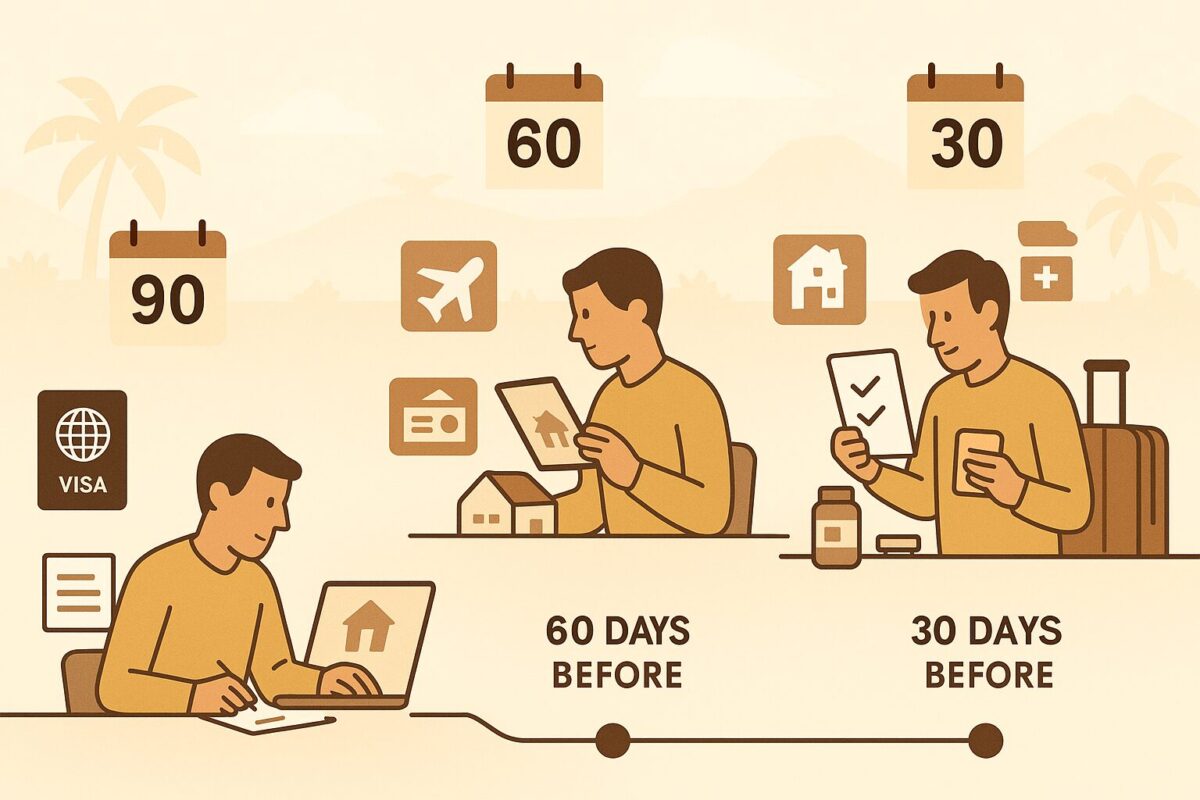
A structured timeline makes the pre-move process far less stressful. Instead of trying to do everything at once, you can work through the transition gradually and confidently. This three-month roadmap gives you a clear sense of what needs to happen and when. It also helps you avoid last-minute paperwork problems, rushed financial decisions or poorly thought-out packing.
Ninety Days Before Departure
This is the planning phase. You have plenty of time, so the goal is to gather information, organise documents and make the big decisions.
- Choose the visa that matches your long term plans
- Check the requirements at your local Thai embassy or consulate
- Begin gathering documents, including proof of income and financial statements
- Order new passport photos
- Research potential locations in Thailand and narrow down your top three
- Create a rough budget for your first six months
- Compare international health insurance options
- Make a digital folder for all important documents
- Notify family and friends of your plans so they can support the transition
This is also the time to address any major commitments at home. Consider what you will do with your car, home, pets or workplace responsibilities.
Sixty Days Before Departure
At this point, the move becomes real. You shift from research to action.
- Apply for the appropriate visa or prepare everything needed for arrival
- Finalise your insurance policy
- Notify your bank about long term overseas travel
- Set up Wise, Revolut or similar accounts
- Book temporary accommodation for your first week in Thailand
- Continue reducing or reorganising belongings
- Arrange storage or sell items you won’t bring
- Make medical appointments if you need updated prescriptions
- Research hospitals or clinics near your target area
If you plan to ship anything, this is the time to get quotes and decide whether it is worth the cost.
Thirty Days Before Departure
With one month to go, you should shift into practical preparation mode.
- Confirm your flight and check luggage allowances
- Make a second check of visa documents
- Print and save digital copies of all important paperwork
- Buy essential items you won’t be able to find easily in Thailand
- Pack a first-month essentials bag containing toiletries, compression straps, small tools, documents and medications
- Begin reducing subscriptions and accounts you no longer need
- Back up your computer and phone
- Clean out your fridge and kitchen
- Finalise goodbye plans with friends and family
This is also the time to review your emotional expectations. Remind yourself that stress and excitement often arrive together in the final weeks.
One Week Before Departure
The final week is about tying up loose ends and setting yourself up for a smooth landing.
- Pack your checked luggage and hand luggage
- Carry important documents in your hand luggage
- Confirm airport transport in Thailand
- Double check your accommodation booking
- Clear your old address of any final items
- Fill essential prescriptions
- Check that authentication apps work on your phone
- Download offline maps for your destination
- Charge your devices and pack adapters
This is often the most hectic phase, so keeping a written list calms the chaos.
The Day You Arrive
Your first 24 hours set the tone for your entire move. Keep it simple.
- Get a Thai SIM card at the airport or a nearby shopping centre
- Withdraw enough cash for basic expenses
- Travel to your accommodation and settle in
- Buy water, snacks and a few household essentials
- Rest, adjust to the climate and recover from the journey
Avoid big decisions on the first day. Focus on sleep, hydration and gentle exploration.
Your First Week in Thailand
Once you have rested, you can begin building momentum.
- Begin apartment hunting
- Set up temporary routines
- Familiarise yourself with local supermarkets and markets
- Use Grab and Google Maps to explore the area
- Identify hospitals, pharmacies and banks nearby
- Join at least one local group or attend a simple meetup
- Check your visa requirements and next appointment dates
Do not worry if everything feels unfamiliar. This is part of the settling process.
A structured timeline makes the move manageable. It keeps you on track without overwhelming you and allows you to enjoy the anticipation instead of drowning in details. By the time you board your flight, you will feel calm, prepared and ready for the chapter ahead.
To Sum Up: Your First Step Starts Now
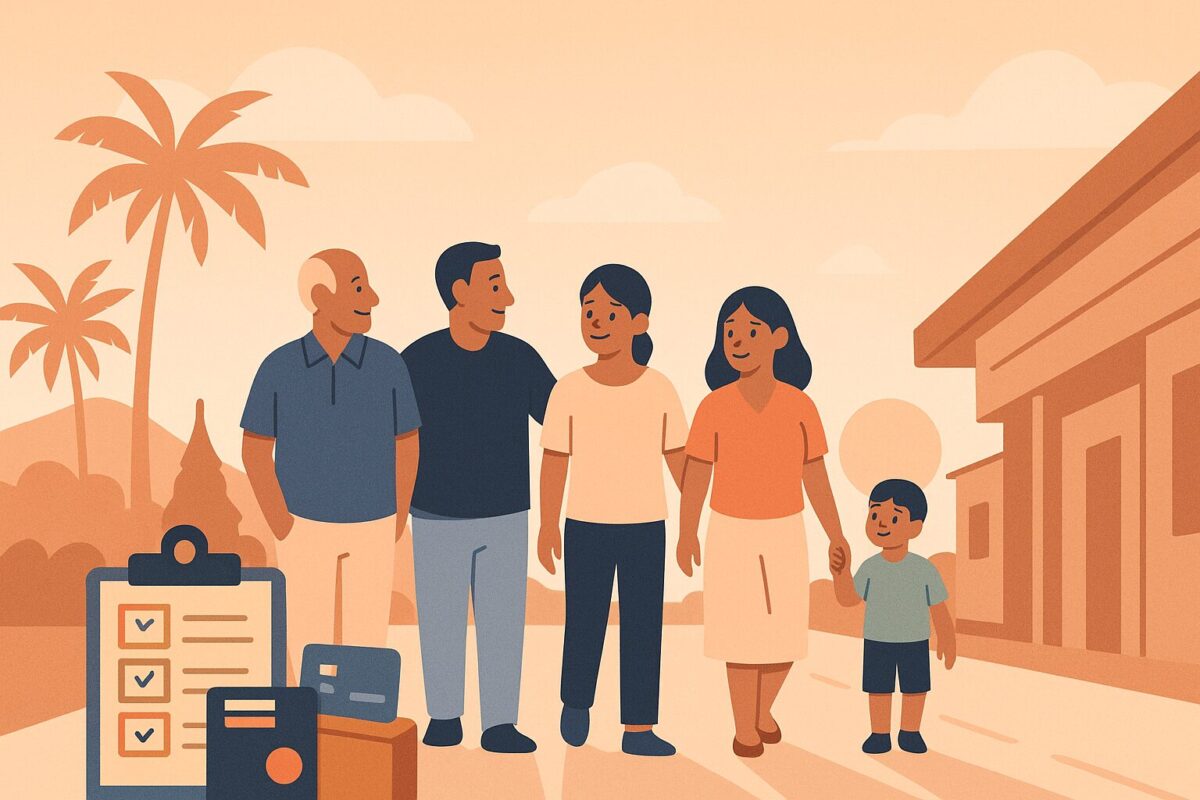
Planning a long term move to Thailand can feel overwhelming at first. There are documents to organise, decisions to make, budgets to build and a mix of emotions. Yet every year, countless people take the same step and settle into fulfilling lives here. The difference between those who thrive and those who struggle often comes down to preparation and mindset.
When you approach the move methodically, with patience and realistic expectations, the transition becomes far smoother.
What you have in front of you now is not just a checklist but a blueprint for creating a stable and enjoyable new life. Each section prepares you for a different part of the journey, from visas and finances to housing, healthcare and emotional wellbeing. None of these tasks needs to be completed overnight. The move becomes manageable when you break it into small steps and follow the timeline at a comfortable pace.
It also helps to remember why you are doing this. Whether you want a slower pace of life, new experiences, warmer weather or a fresh start after many years of routine, Thailand offers a chance to reinvent your everyday life. The challenges you face in the beginning are part of the process, and they will eventually give way to familiar routines and new friendships.
Your relocation will not be perfect, and it does not need to be. There will be days when things feel confusing or unexpectedly emotional. There will also be days when everything falls into place and you feel grateful for choosing a path that few people are brave enough to take. With thoughtful planning and a willingness to adapt, you can build a life here that feels peaceful, rewarding and balanced.
The first step is simple. Start working through the checklist, make the small decisions and keep moving forward. Once you arrive, the rest of the journey unfolds naturally. Thailand will not just be a place you move to. It will become a place where you feel at home.
Useful Resources for Planning Your Move to Thailand
Official Information, Visas and Entry Requirements
- Tourism Authority of Thailand (TAT) – Official national tourism site with background on regions, events and travel practicalities.
- Thailand.go.th – Government Information Portal – Official gateway to government services, regulations and practical information for residents and visitors.
- Thai E-Visa – Official Application Portal – The official Ministry of Foreign Affairs e-visa site for applying online before you travel.
- Thailand Digital Arrival Card (TDAC) – Official online arrival card that must be completed before entry, replacing the old paper TM6.
- Long-Term Resident (LTR) Visa – BOI – Official details on Thailand’s LTR visa categories, benefits and requirements.
- LTR Visa Required Documents – Breakdown of financial and documentation criteria by LTR visa category.
Moving Guides and Cost of Living
- Moving to Thailand: A Guide for Expats – ExpatDen – Long form guide written by long-term expats covering visas, banking, housing and everyday life.
- Expat in Thailand – Start Here – Curated index of key Thailand articles on visas, work, healthcare and practical setup.
- Cost of Living in Thailand 2025 – ThaiEmbassy.com – Recent breakdown of accommodation, food, transport and lifestyle costs around Thailand.
- Cost of Living in Thailand in 2025 – Thai Visa Expert – Practical numbers and scenarios aimed at retirees and long-term residents.
- Cost of Living in Thailand – Siam Real Estate – Useful comparison of monthly budgets in different regions and lifestyle levels.
- Move to Thailand Checklist – Luma – A concise pre-move checklist that complements this guide with an insurance focus.
Healthcare, Hospitals and Medical Resources for New Expats
- Bumrungrad International Hospital – One of Asia’s top private hospitals. Excellent for general healthcare, checkups, diagnostics and specialist appointments.
- Samitivej Hospital – Highly regarded private hospital network, especially strong for family medicine and children’s health.
- Bangkok Hospital Network – Nationwide private hospital group with English-speaking staff and a wide range of medical services.
- Thai Health Promotion Foundation – Government-run public health information resource with guides on disease prevention, lifestyle and general wellness.
- Department of Disease Control (DDC), Ministry of Public Health – Updates on vaccines, seasonal illnesses, environmental health alerts and travel health guidance.
- WHO Thailand Office – Reliable health advisories, disease information and public health updates relevant to residents.
- Luma Health Insurance Thailand – Clear breakdowns of expat-friendly health insurance plans, coverage options and hospital partnerships.
- Pacific Prime Thailand – Broker with comparisons of expat medical insurance policies, useful for understanding costs and coverage.
- ThaiEmbassy.com – Expat Health Insurance Guide – Overview of health insurance requirements for different visa types and practical advice for newcomers.
- Pharmacy Thailand (Medication Finder) – Helps identify Thai equivalents for common foreign medications and locate nearby pharmacies.
- Thai Red Cross Society – National resource for blood donations, vaccinations and public health services.
Essential Apps for Everyday Life in Thailand
These apps are widely used by long-term expats and make daily life far easier, from transport and payments to food delivery and communication.
- Grab – Ride-hailing, food delivery, grocery delivery, couriers. Download
- Bolt – Cheaper alternative to Grab for taxis and motorbike taxis. Download
- LINE Taxi – Taxi booking directly inside the LINE app. Learn More
- ViaBus – Real-time bus tracking in Bangkok, Chiang Mai and other cities. Website
- BTS SkyTrain / MRT Apps – Official route maps, fares and service updates. BTS | MRT
- Wise – Low-fee international transfers and multi-currency banking. Website
- Remitly – International transfers , not only to bank accounts but also mobile wallets and cash pickup. Website
- Revolut – Foreign currency exchange and virtual cards for online purchases. Website
- LINE – Thailand’s main messaging app used by landlords, shops and friends. Download
- FoodPanda – Major food delivery platform used across Thailand. Website
- LINE Man – Food delivery, grocery delivery, courier service. Website
- Lazada – Thailand’s Amazon equivalent for electronics, home goods and essentials. Website
- Shopee – Another major online shopping platform often with lower prices. Website
- Flash Express – Parcel deliveries and sending packages domestically. Website
- Thailand Post Track & Trace – Checking parcel status. Website
- 12Go Asia – Trains, ferries, buses and transfers in Thailand and SE Asia. Website
- AirVisual / IQAir – Real-time air quality monitoring (important for Chiang Mai). Download
- Medicines Info / ThaiDrugSearch – Find Thai equivalents for foreign medication. Website
- Thai2English Dictionary – Great for quick translations and phonetics. Website
- Mango Languages / Drops / Ling – Structured Thai language learning apps.
Ling App - Thai Emergency Numbers – Not an app, but essential:
- 191 – Police
- 1669 – Medical Emergency
- 199 – Fire
- Tourist Police 1155 (English-speaking)
Video Guides and YouTube Playlists
- How to Move to Thailand in 2025 – Complete Visa & Tax Guide – Video overview of current visa options and tax considerations for new expats.
- If You Want to Move to Thailand in 2025, I’d Do This… – Practical look at preparing for relocation, expectations and first steps.
- Moving to Thailand? Your First 30 Days Step-by-Step – A structured first-month plan that pairs well with the 90-day roadmap in this article.
- Moving to Thailand – Playlist – Series of videos on planning, arrival and settling into expat life in Thailand.


